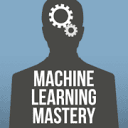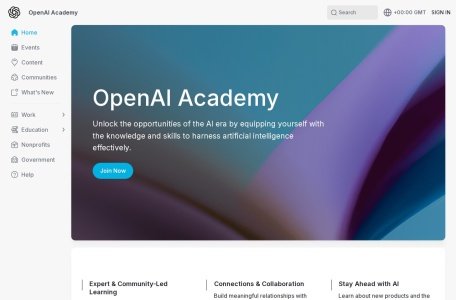
In 2025, the pace of AI technological iteration continues to accelerate, yet challenges like “scarce systematic learning resources” and “disconnect between theory and practice” still plague learners. Against this backdrop, OpenAI – the AI giant behind ChatGPT and DALL-E – officially launched its official learning platform: OpenAI Academy. Dubbed the “Universal University of AI” by industry insiders, this platform, characterized by free access, official authority, and a practice-oriented approach, is reshaping the global AI learning ecosystem. Combining official information and hands-on experience, this guide comprehensively breaks down its course structure, practical value, and learning strategies to help users from diverse backgrounds master AI skills efficiently.
I. Platform Positioning: OpenAI’s Official “Hub for AI Knowledge Inclusivity”
- Authoritative Synchronization: Course content is directly designed by OpenAI’s engineering team, staying in real-time sync with GPT model updates and API iterations. This guarantees learners access to the most cutting-edge technical standards. For instance, new features of multimodal models launched in 2025 were integrated into advanced course cases within just one week.
- Universal Inclusivity: It breaks down geographical, educational, and payment barriers. Users worldwide can unlock all content for free by registering with an email or OpenAI account, welcoming participants from middle school students to retirees.
- Ecosystem Connectivity: As the official gateway to OpenAI’s technical ecosystem, the platform links model users, developers, and industry demand parties, forming a complete “learn-practice-apply” loop.
II. Core Course Structure: A Three-Stage Path for All Learner Needs
(1) Beginner Level: Building an AI Knowledge Framework with Zero Barriers
- AI Literacy Fundamentals: A 1-hour introduction to key concepts like AI ethics and generative model principles, paired with basic ChatGPT operation demos. It is particularly suitable for ordinary professionals and educators.
- Python Basics & Mathematical Principles: Lays the groundwork for technical learning, covering prerequisites such as linear algebra and calculus. It includes VS Code environment setup tutorials and code examples, allowing beginners to complete environment configuration step-by-step.
- AI Intro for Seniors (Live Sessions): Held weekly in the morning (CST), these sessions use plain language to explain practical skills like smart device connectivity and misinformation identification. Since its launch, the highest single-session viewership has exceeded 10,000.
(2) Advanced Level: Mastering OpenAI’s Tech Stack in Depth
- API Development Series: Covers everything from basic calls to advanced parameter optimization, with accompanying API test credits worth $1 million. Learners can practically develop projects like custom AI assistants and multimodal applications. For example, the GraphRAG Knowledge Graph Construction course provides complete code templates; following the tutorial allows users to build an enterprise knowledge base within 3 hours.
- Neural Network Specialization: Adopts a “9-Step Learning Method,” progressing from linear regression and nonlinear classification to deep network models like DNN, CNN, and RNN. Each step includes runnable Python code examples, enabling learners to master model inference and deployment skills upon completion.
- Prompt Engineering Masterclass: Taught by senior OpenAI engineers, it breaks down Prompt optimization techniques for 12 scenarios, paired with real-time interactive exercises. Learners report that “model response accuracy improves by over 40% after mastering these skills.”
(3) Industry Specializations: AI Implementation Solutions for Specific Scenarios
- Education Sector: ChatGPT K-12 Education Application Guide, co-developed by OpenAI and Common Sense Media, provides 9 types of templates (e.g., lesson plan generation, personalized tutoring) and has been adopted by dozens of schools in the United States.
- Nonprofit & Commercial Sectors: Courses like AI for Nonprofits and AI in Elderly Care analyze technical implementation paths through real cases such as Goodwill Keystone resume optimization and intelligent caregiving systems.
- Enterprise Empowerment: AI Business Transformation Strategy for managers covers scenarios like customer service automation and data analysis, helping business owners identify opportunities for AI-driven growth.
III. Distinctive Features: An Ecosystem Beyond “Learning”
1. Direct Expert Access & Community Co-Creation
2. Global Practical Resource Linkages
3. Certification System (Pilot in 2026)
IV. Target Audience & Learning Strategies
(1) Precise Audience Profiles
Audience Type | Core Needs | Recommended Learning Path | Study Duration |
AI Beginners | Build AI cognition & master practical skills | Beginner Courses + Prompt Engineering + Industry Specializations | 2–4 weeks |
Students/Developers | In-depth technical learning & project practice | Python Basics + API Development + Neural Network Specialization | 1–3 months |
Educators | AI application in teaching scenarios | Education Specializations + ChatGPT Basics + Community Exchanges | 1–2 weeks |
Business Owners/Managers | Uncover AI business value | Industry Specializations + AI Transformation Strategy + Offline Workshops | 2–3 weeks |
(2) Practical Tips for Efficient Learning
- Resource Utilization: After registration, prioritize claiming API test credits. Practice in parallel while learning API development courses to avoid “forgetting after learning.”
- Time Management: Use fragmented time for beginner courses; reserve 3–4 consecutive hours of hands-on time for advanced courses. Pair with “course notes + code comments” to reinforce learning outcomes.
- Community Engagement: Actively submit assignments and participate in reviews. Outstanding works may earn one-on-one guidance from OpenAI engineers, or even internal referral opportunities.
- Forward Planning: Follow updates on the certification preparation camp. Early participation in practical projects can improve certification pass rates.
V. Future Plans & Usage Notes
1. Upcoming Core Features
- Multilingual Support: Chinese, Spanish, and other language versions of courses are planned for 2025. Currently, the English interface is compatible with mainstream translation plugins, which barely affects learning.
- Global Offline Expansion: Workshops have been held in the United States; events for the Chinese market are in preparation. Users can apply to be local event hosts via academy@openai.com.
- Certification System Enhancement: The first batch of certifications will focus on high-demand areas like Prompt Engineering and API Development, with assessments including both theoretical tests and practical projects.
2. Access & Usage Notes
- Official Website: https://academy.openai.com, accessible via mainstream browsers without special software installation.
- Resource Acquisition: Course videos and documents can be downloaded for free; code examples need to be cloned locally via Git client. Detailed environment setup tutorials are available in the “Beginner Tutorials – Environment Preparation” module.
- Community Rules: Advertising is prohibited in professional exchange groups; violations will result in restricted interaction rights to maintain a learning-focused community atmosphere.
Conclusion: The “Official Answer Key” for AI Learning Has Arrived
Relevant Navigation


AI University Hall

ML for Beginners

WaCuoWang

Proofig

MachineLearningMastery

MuleRun

CodeFlying

